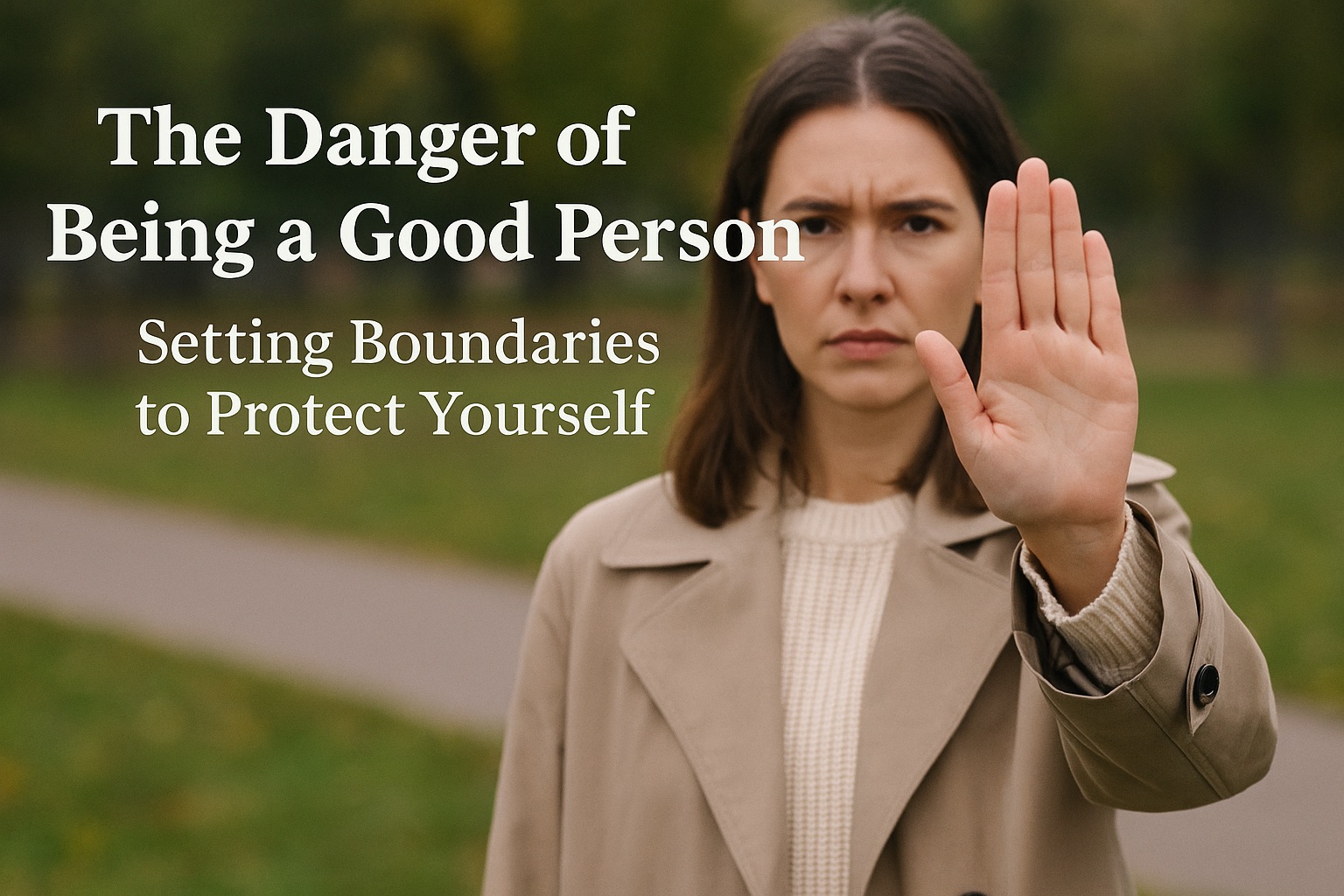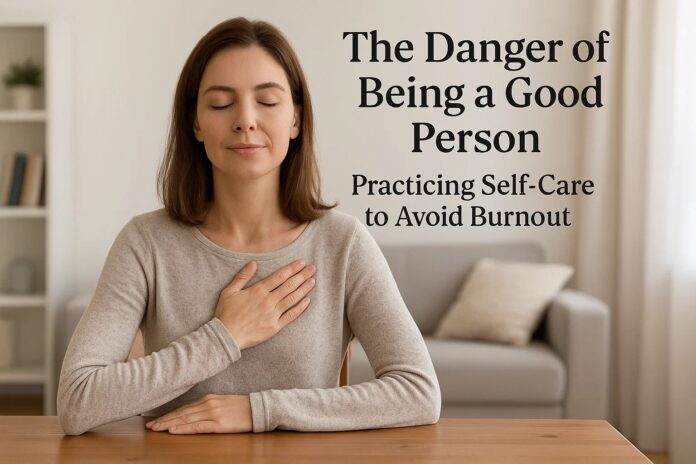The Danger of Being a Good Person: Why Kindness Can Be Harmful
Being a good person is often seen as one of the highest virtues. From a young age, we’re taught that kindness, empathy, and selflessness are qualities to aspire to. However, while these traits are undoubtedly important, there are certain dangers that come with always trying to do the right thing. In this article, we’ll explore the hidden risks of being too good, and why, sometimes, putting others’ needs ahead of your own can be harmful.
Why Being a Good Person Might Actually Be Dangerous
When you consistently put others’ needs before your own, you risk neglecting yourself. While helping others is commendable, it can lead to burnout and stress if done excessively. According to Psychology Today on the effects of burnout, the constant act of caring for others without taking time for yourself can leave you emotionally and physically drained. It’s important to recognize that there is such a thing as being too good. Let’s break down the hidden dangers that often go unnoticed.
1. Burnout from Constant Selflessness
Good people tend to give a lot of themselves—emotionally, physically, and mentally. Unfortunately, the constant act of helping others can wear you down. This is especially true if you’re frequently saying “yes” to everything, even at the cost of your own well-being. Over time, this can result in exhaustion that’s difficult to recover from.
Signs of burnout include:
- Feeling exhausted despite rest
- Losing interest in activities you once enjoyed
- Experiencing irritability or frustration
- Difficulty concentrating
2. People-pleasing at the Cost of Your Own Needs
Being overly concerned with pleasing others can lead to a cycle of self-sacrifice. You may find yourself compromising your own needs, desires, or values just to avoid conflict or to gain approval. Sadly, this often results in you feeling undervalued and resentful.
How people-pleasing harms you:
- You lose sight of your own desires.
- It can lead to resentment, as you might feel unappreciated.
- It creates an unhealthy dependency on others’ approval.
3. Being Taken Advantage Of
While helping others is good, it’s also important to set boundaries. If you don’t, some people might take advantage of your kindness and exploit your willingness to help. This can leave you emotionally drained and feeling like your efforts go unnoticed.
Signs of being taken advantage of:
- You often feel drained after interactions.
- People rarely return the favor.
- You feel guilty for saying “no” to requests.
4. Losing Yourself in the Process
When you focus too much on others, you may forget to nurture your own growth and happiness. In doing so, it becomes easier to lose your sense of self and feel disconnected from your true desires. It’s essential to maintain a balance and ensure you’re taking time for yourself. Practicing emotional self-care is an important step in preventing this.
Ways to stay connected to yourself:
- Practice self-care and prioritize your health.
- Set time aside for hobbies and activities you enjoy.
- Reflect regularly on your personal goals and desires.

- The Danger of Being a Good Person
5. Creating Unrealistic Expectations
When you’re always available, people begin to expect it. You may unknowingly create an environment where others assume you’re always there to help. This can lead to unrealistic demands on your time and energy, putting unnecessary pressure on you.
How to avoid unrealistic expectations:
- Be clear about your boundaries.
- Say “no” when necessary, without feeling guilty.
- Help others within your limits, and don’t overextend yourself.
6. Emotional Drainage
Constantly taking on the emotional weight of others can take a toll on your mental health. Being a “good person” often means listening to others’ problems without having the opportunity to share your own. Eventually, this leads to emotional exhaustion and feelings of depletion.
Prevent emotional drainage by:
- Talking to a trusted friend or therapist about your feelings.
- Setting emotional boundaries and taking breaks when needed.
- Ensuring you’re emotionally supported by others as well.
The Importance of Balance: How to Be a Good Person Without Losing Yourself
Being a good person doesn’t mean you have to give up your own well-being. In fact, it’s about finding a balance between caring for others and caring for yourself. Prioritizing your needs and setting healthy boundaries is essential to maintaining your mental, emotional, and physical health.
Tips for Maintaining Balance:
- Set Boundaries: Know when to say “no” and protect your personal time.
- Practice Self-Care: Make time for activities that recharge you.
- Seek Support: Don’t be afraid to ask for help or lean on others for emotional support.
Frequently Asked Questions (FAQs)
1. Is it wrong to be a good person?
No, being a good person is not wrong. However, constantly prioritizing others at the expense of your own well-being can lead to negative consequences. Therefore, it’s important to find a balance and take care of yourself as well.
2. How can I stop being taken advantage of?
Setting boundaries is key. Be clear about your limits and don’t be afraid to say “no” when someone asks too much of you. Assertiveness is important in protecting your time and energy.
3. What is emotional burnout and how can I avoid it?
Emotional burnout occurs when you give too much of yourself to others, leaving you feeling exhausted, drained, and unfulfilled. To avoid it, make self-care a priority and take regular breaks to recharge.
4. Can being a good person affect my mental health?
Yes, constantly putting others’ needs first can take a toll on your mental health. It can lead to feelings of resentment, anxiety, and stress. Therefore, practicing self-care and setting boundaries is crucial for maintaining mental well-being.
5. How can I maintain a balance between helping others and taking care of myself?
To maintain balance, prioritize your own health and well-being. Set clear boundaries, practice self-care, and don’t be afraid to ask for help when needed. This ensures that you remain healthy while supporting others.
Conclusion
While being a good person is admirable, it’s important to recognize that too much selflessness can be harmful. By setting boundaries, prioritizing your needs, and maintaining a balance between helping others and caring for yourself, you can avoid the dangers of being overly good. Remember, in order to help others, you must first take care of yourself.


